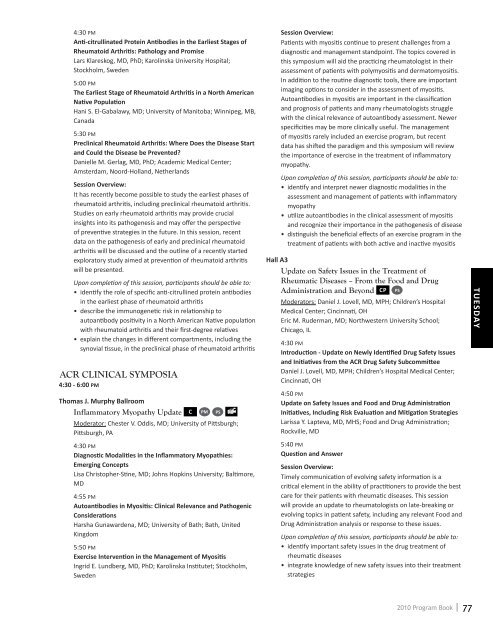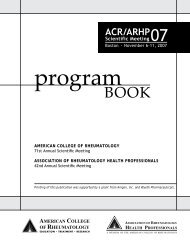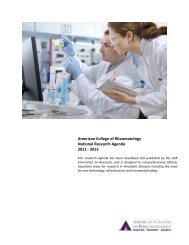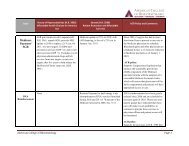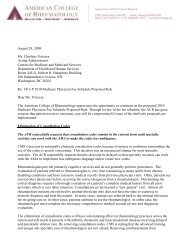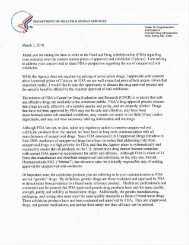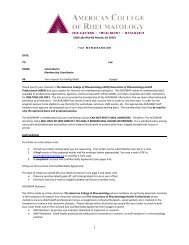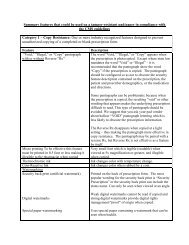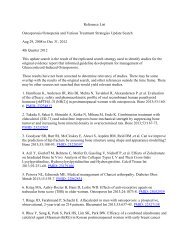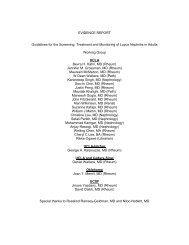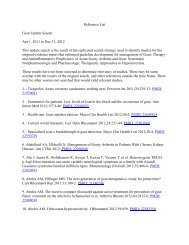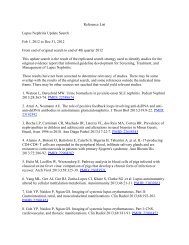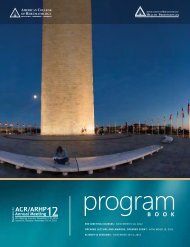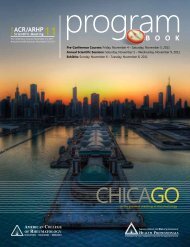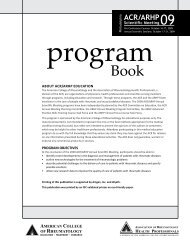B O O K - American College of Rheumatology
B O O K - American College of Rheumatology
B O O K - American College of Rheumatology
Create successful ePaper yourself
Turn your PDF publications into a flip-book with our unique Google optimized e-Paper software.
4:30 PM<br />
Anti-citrullinated Protein Antibodies in the Earliest Stages <strong>of</strong><br />
Rheumatoid Arthritis: Pathology and Promise<br />
Lars Klareskog, MD, PhD; Karolinska University Hospital;<br />
Stockholm, Sweden<br />
5:00 PM<br />
The Earliest Stage <strong>of</strong> Rheumatoid Arthritis in a North <strong>American</strong><br />
Native Population<br />
Hani S. El-Gabalawy, MD; University <strong>of</strong> Manitoba; Winnipeg, MB,<br />
Canada<br />
5:30 PM<br />
Preclinical Rheumatoid Arthritis: Where Does the Disease Start<br />
and Could the Disease be Prevented?<br />
Danielle M. Gerlag, MD, PhD; Academic Medical Center;<br />
Amsterdam, Noord-Holland, Netherlands<br />
Session Overview:<br />
It has recently become possible to study the earliest phases <strong>of</strong><br />
rheumatoid arthritis, including preclinical rheumatoid arthritis.<br />
Studies on early rheumatoid arthritis may provide crucial<br />
insights into its pathogenesis and may <strong>of</strong>fer the perspective<br />
<strong>of</strong> preventive strategies in the future. In this session, recent<br />
data on the pathogenesis <strong>of</strong> early and preclinical rheumatoid<br />
arthritis will be discussed and the outline <strong>of</strong> a recently started<br />
exploratory study aimed at prevention <strong>of</strong> rheumatoid arthritis<br />
will be presented.<br />
Upon completion <strong>of</strong> this session, participants should be able to:<br />
• identify the role <strong>of</strong> specific anti-citrullined protein antibodies<br />
in the earliest phase <strong>of</strong> rheumatoid arthritis<br />
• describe the immunogenetic risk in relationship to<br />
autoantibody positivity in a North <strong>American</strong> Native population<br />
with rheumatoid arthritis and their first-degree relatives<br />
• explain the changes in different compartments, including the<br />
synovial tissue, in the preclinical phase <strong>of</strong> rheumatoid arthritis<br />
ACR Clinical Symposia<br />
4:30 - 6:00 PM<br />
Thomas J. Murphy Ballroom<br />
Inflammatory Myopathy Update C PM PS<br />
Moderator: Chester V. Oddis, MD; University <strong>of</strong> Pittsburgh;<br />
Pittsburgh, PA<br />
4:30 PM<br />
Diagnostic Modalities in the Inflammatory Myopathies:<br />
Emerging Concepts<br />
Lisa Christopher-Stine, MD; Johns Hopkins University; Baltimore,<br />
MD<br />
4:55 PM<br />
Autoantibodies in Myositis: Clinical Relevance and Pathogenic<br />
Considerations<br />
Harsha Gunawardena, MD; University <strong>of</strong> Bath; Bath, United<br />
Kingdom<br />
5:50 PM<br />
Exercise Intervention in the Management <strong>of</strong> Myositis<br />
Ingrid E. Lundberg, MD, PhD; Karolinska Institutet; Stockholm,<br />
Sweden<br />
Session Overview:<br />
Patients with myositis continue to present challenges from a<br />
diagnostic and management standpoint. The topics covered in<br />
this symposium will aid the practicing rheumatologist in their<br />
assessment <strong>of</strong> patients with polymyositis and dermatomyositis.<br />
In addition to the routine diagnostic tools, there are important<br />
imaging options to consider in the assessment <strong>of</strong> myositis.<br />
Autoantibodies in myositis are important in the classification<br />
and prognosis <strong>of</strong> patients and many rheumatologists struggle<br />
with the clinical relevance <strong>of</strong> autoantibody assessment. Newer<br />
specificities may be more clinically useful. The management<br />
<strong>of</strong> myositis rarely included an exercise program, but recent<br />
data has shifted the paradigm and this symposium will review<br />
the importance <strong>of</strong> exercise in the treatment <strong>of</strong> inflammatory<br />
myopathy.<br />
Upon completion <strong>of</strong> this session, participants should be able to:<br />
• identify and interpret newer diagnostic modalities in the<br />
assessment and management <strong>of</strong> patients with inflammatory<br />
myopathy<br />
• utilize autoantibodies in the clinical assessment <strong>of</strong> myositis<br />
and recognize their importance in the pathogenesis <strong>of</strong> disease<br />
• distinguish the beneficial effects <strong>of</strong> an exercise program in the<br />
treatment <strong>of</strong> patients with both active and inactive myositis<br />
Hall A3<br />
Update on Safety Issues in the Treatment <strong>of</strong><br />
Rheumatic Diseases – From the Food and Drug<br />
Administration and Beyond cP PS<br />
Moderators: Daniel J. Lovell, MD, MPH; Children’s Hospital<br />
Medical Center; Cincinnati, OH<br />
Eric M. Ruderman, MD; Northwestern University School;<br />
Chicago, IL<br />
4:30 PM<br />
Introduction - Update on Newly Identified Drug Safety Issues<br />
and Initiatives from the ACR Drug Safety Subcommittee<br />
Daniel J. Lovell, MD, MPH; Children’s Hospital Medical Center;<br />
Cincinnati, OH<br />
4:50 PM<br />
Update on Safety Issues and Food and Drug Administration<br />
Initiatives, Including Risk Evaluation and Mitigation Strategies<br />
Larissa Y. Lapteva, MD, MHS; Food and Drug Administration;<br />
Rockville, MD<br />
5:40 PM<br />
Question and Answer<br />
Session Overview:<br />
Timely communication <strong>of</strong> evolving safety information is a<br />
critical element in the ability <strong>of</strong> practitioners to provide the best<br />
care for their patients with rheumatic diseases. This session<br />
will provide an update to rheumatologists on late-breaking or<br />
evolving topics in patient safety, including any relevant Food and<br />
Drug Administration analysis or response to these issues.<br />
Upon completion <strong>of</strong> this session, participants should be able to:<br />
• identify important safety issues in the drug treatment <strong>of</strong><br />
rheumatic diseases<br />
• integrate knowledge <strong>of</strong> new safety issues into their treatment<br />
strategies<br />
tuesday<br />
2010 Program Book 77


